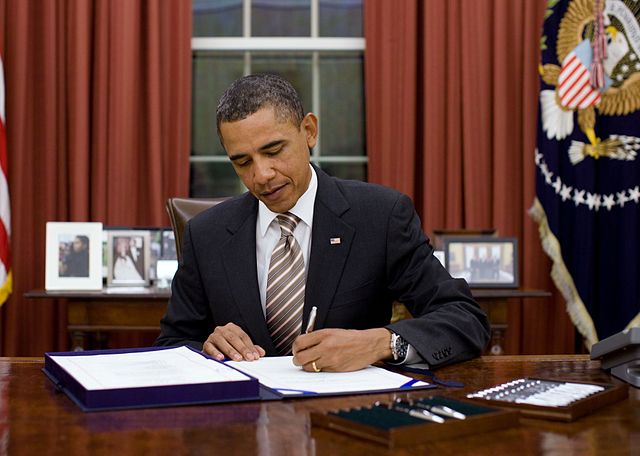
From Roger Runningen & Brian Faler, Bloomberg: President Barack Obama signed into law a catchall government-funding bill that ends the 2013 budget fight and locks in $85 billion in spending cuts he opposes.
With Obama’s signature yesterday, day-to-day operations of cabinet departments and federal agencies will continue without interruption through Sept. 30, the end of the fiscal year. With the automatic budget cuts known as sequestration taking effect, the spending will amount to about $984 billion. The previous funding authorization was due to expire today. . . .
The measure Obama signed yesterday leaves intact $85 billion in across-the-board budget cuts for this fiscal year of 5 percent to domestic agencies and 8 percent for the Defense Department. It includes authority for some leeway to shift funds. . . .
The funding bill that became law yesterday, known as the “continuing resolution,” passed the House March 21 in a 318-109 vote and was approved by the Senate a day earlier, 73-26.
From Andrea Shalal-Esa, Reuters: A stop-gap spending measure passed by the Congress last week will allow Lockheed Martin Corp and its partners in Italy and Germany to complete the last year of development of a missile defense system, averting possible termination fees and international fallout.
The legislation funds the U.S. government through the end of the 2013 fiscal year on September 30, averting a shutdown this week, while giving the Pentagon and a few other agencies more say about how to achieve $85 billion in automatic spending cuts.
Cheryl Amerine, a spokeswoman for Lockheed, said the continuing budget resolution passed by Congress includes funding for the final year of development of the Medium Extended Air and Missile Defense System, known as MEADS, which was designed as a successor to the Patriot missile defense system.
Top U.S. defense officials and their counterparts in Germany and Italy had warned Congress that cutting off funding for the program could cause problems between Washington and its allies, who have spent a combined $4 billion on the program to date, and would have triggered steep termination fees. (photo: White House)
Image: white%20house%203%2028%2013%20Obama.jpg
